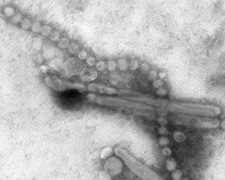18 February 2015. Researchers at University of Chicago and Mount Sinai medical centers found people who receive the seasonal flu vaccine also generate antibodies that in lab cultures and animals act against avian (H7N9) and other influenza strains. The team led by Chicago’s Patrick Wilson and Mount Sinai’s Florian Krammer published its findings yesterday in the Journal of Clinical Investigation.
Public health authorities first spotted the human H7N9 virus in China in March 2013, which were believed to first infect poultry and later spread to humans in contaminated environments. Most patients infected with H7N9 experienced severe respiratory illness, with deaths occurring in about one-third of the cases. However, no cases of person-to-person transmission were found, nor were any cases detected in people or birds in the U.S.
Wilson, Krammer, and colleagues were testing the ability of seasonal vaccines, designed to cover more common flu strains, to also prevent infections from uncommon yet still dangerous forms of the disease. Outbreaks of flu each winter are caused by two types of viruses labelled A and B, with a third (C) type of virus causing a less common and severe form of respiratory illness. The two main types of viruses are collections of sub-types and strains that appear irregularly from one flu season to the next.
Public health authorities worldwide plan each year for producing the composition of next season’s vaccines based on research and surveillance coordinated by World Health Organization. The aim of the annual vaccine is to generate an immune response broad enough to prevent seasonal flu infections, even though the strain of A or B viruses may be different from one year to the next. Among the more common varieties covered by seasonal flu vaccines are H3 strains, part of the A group of viruses.
The Chicago/Mount Sinai team isolated antibodies found in 28 volunteers who received a seasonal flu shot, with 83 antibodies identified from the samples. The vaccine was designed to protect against the common H3N2 flu virus, among other more common A and B strains, but the team found in lab cultures 3 of the 83 antibodies also reacted against H7 viruses — part of the A group — even though they were not among the intended targets. In addition, the 3 antibodies appeared to thoroughly counteract H7N9 viruses.
The researchers then tested the 3 antibodies against H7N9 viruses in lab mice. The team inoculated a set of lab mice with the antibodies, and exposed the inoculated mice and a comparable control group to a lethal dose of H7N9 virus. The inoculated mice survived the exposure, while mice in the control group died.
The Chicago/Mount Sinai researchers also tested the antibodies as a therapy, giving a set of lab mice exposed to H7N9 viruses the 3 antibodies about 24 hours after exposure, with the antibodies succeeding in protecting their recipients. The team tested the antibodies against other H3 and H7 varieties, and found the antibodies could neutralize these other strains as well.
The researchers note the antibodies bind to a part of the virus, known as the stalk region, common to both H3 and H7 strains, with the differences in efficacy against the strain likely due to variations in the way the antibodies bind to the viruses. In addition, the antibodies were shown to have at least some effect on viruses with mutations in the stalk region.
Nonetheless, the low number of effective antibodies against H7 strains — 3 of 83 antibodies found in the volunteers — suggest vaccine developers need to find ways of amplifying their effects to protect against less common flu types. “The challenge is to exploit this response on a larger scale to make vaccines or therapeutics that offer broad protection against influenza strains,” says Wilson in a University of Chicago statement. “For now, it’s clear that seasonal flu vaccination provides defense against more than just common strains. Everyone should be vaccinated.”
Read more:
- $50M Grant Funding Research to Improve Vaccine Effects
- Gates Foundation Funds Malaria Vaccine Development
- Ebola-Marburg Vaccine Development, Testing Contract Awarded
- U.S. Patent Awarded for Freeze-Dried Vaccine Formulation
- PBS to Air Documentary on Vaccine Attitudes and Disease
* * *


 RSS - Posts
RSS - Posts
[…] Flu Vaccine Shown to Protect Against Avian Influenza […]